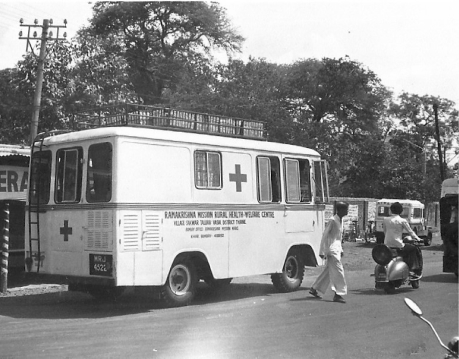History of the Centre




It began with Medical Camps to Sakwar in the early 1970s
- Ramakrishna Mission Rural Health and Welfare services began with enthusiastic group of doctors and volunteers in the 1970s visiting tribal villages under the guidance of Monks and directions of Revered Swami Hiranmayanandaji and Revered Swami Akamanandaji.
- Medical camps were conducted under a tree and free medicines, nutrition, food, clothes, etc. were distributed to patients.
A Pilot Centre starts in 1974
- The Government of Maharashtra leased out 10 acres of land for the upliftment of the Rural and Tribal villages.
- A Dispensary shed structure was put up and every Sunday, a mini bus carrying doctors, paramedics and volunteers would treat nearly 800 to 1000 patients in the course of the day and return in the evening.
- As the number of patients increased, K.E.M. Hospital and Nair Hospital graciously deputed Senior Doctors, Resident Junior Doctors and Interns to visit the Centre.
- A small shrine and multipurpose shed was setup for feeding patients etc.
The Centre expands it’s facilities in 1976
A newly constructed Centre building was inaugurated in 1976. Srimat Swami Vireswaranandaji Maharaj, the President of Ramakrishna Math and Ramakrishna Mission paid a visit to Sakwar and blessed this project and the newly constructed building on 9th December, 1976.
Later, a building containing a large OPD, a small operation theatre, a pathological and an ophthalmic unit was also started.
Subsequently, the Centre starting engaging with socio-economic problems in the area and developed an integrated development model
Vocational Training
Vocational training classes began with Tailoring gradually other trades like Carpentry, Electrical Wiring, Motor Mechanic courses affiliated to the Maharashtra Vocational Examination Board stated in the 1996. Tata Motors and Tata Telecommunications sponsored these trainings and used to absorb these trainees and encourage them to start their own units in villages.
Training of Medical Social Workers
Students who have passed primary or higher secondary examinations were trained to become medical social workers. The training particularly emphasized – maintaining health and hygiene, nutritious food, regular check-ups and regular intake of medicines for T.B. and Leprosy diseaseses.
Agricultural Mentoring to enable them to be self-reliant
Subsequently a lot of agriculture-related activities have been undertaken to upgrade the surrounding area – reclaiming land, creating medicinal gardens, utilization of wastewater, development of better techniques of cultivation, loans to small farmers, road building, etc.
Glimpses into the history of the Centre











